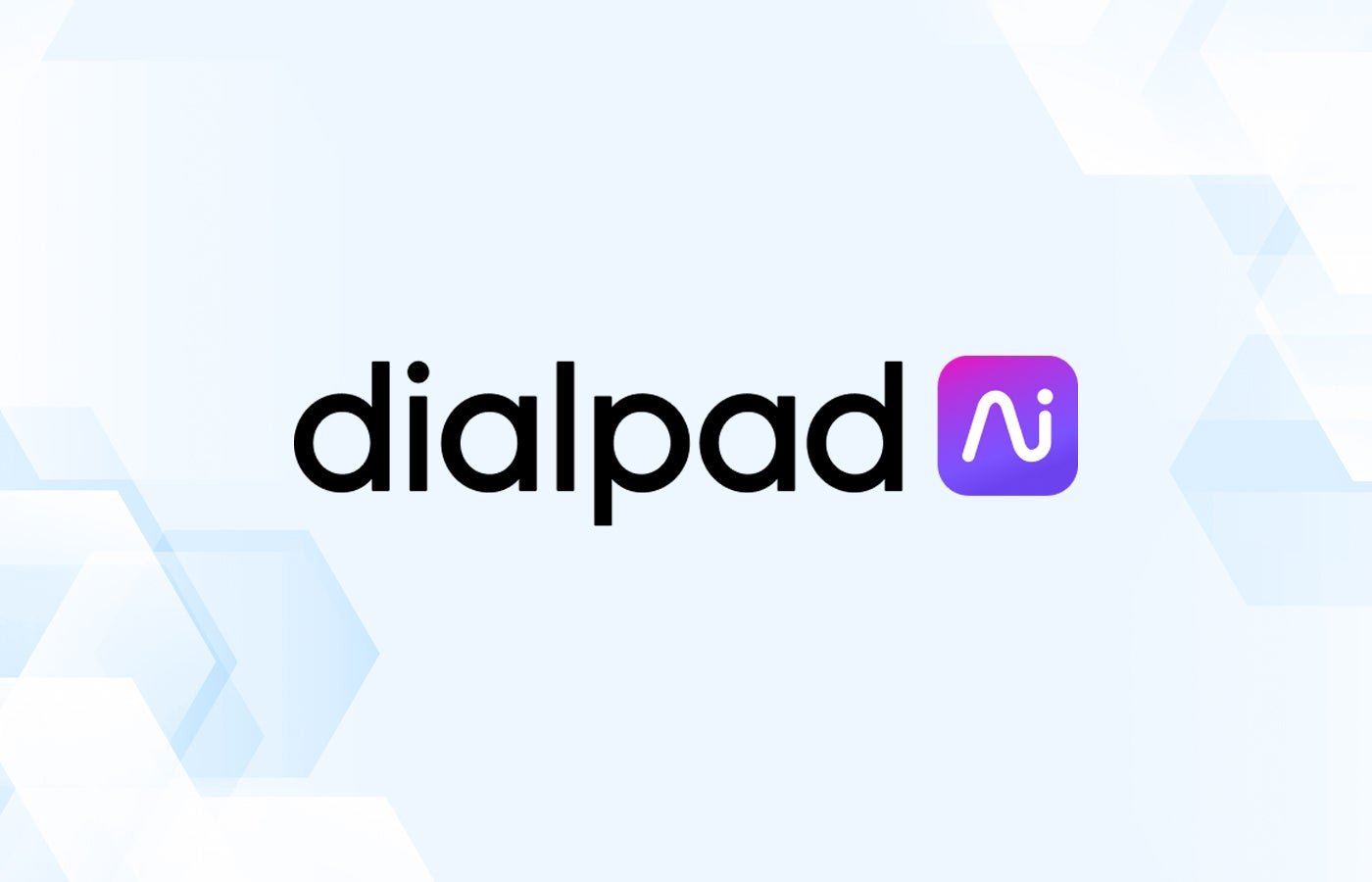Dialpad’s fast factsStarting price: $15 per user per month Key features:
|
Dialpad is a feature-rich business communication platform with a clean dashboard and modern user-experience. The company invested heavily in AI and machine learning, long before they were the hottest contact center trends — and the payoff is that even the cheapest Dialpad products are infused with the latest AI capabilities.
While the entry-level plan comes at an attractive price point, Dialpad’s contact center solutions are fairly average for the space in terms of price.
Dialpad is best suited for contact centers and sales teams looking to automate and boost productivity. Small businesses looking for basic calling features will get a better value elsewhere.
Dialpad’s pricing
Dialpad has four main product offerings, each with its own pricing and plan tiers.
Business Communications
- Standard: Starts at $15 per user per month
- Pro: Starts at $25 per user per month
- Enterprise: Custom pricing
Good For: Smaller businesses that need calling, texting, team chat and video meetings.
AI Meetings
- Free: $0
- Business: Starts at $15 per user per month
Good For: Hosting video meetings for up to five hours with up to 150 participants (with the Business plan). Otherwise, the business communication plans have enough for basic video meetings at the same price.
AI Contact Center
- Essentials: Starts at $80 per user per month
- Advanced: Starts at $115 per user per month
- Premium: Starts at $150 per user per month
Good For: High-volume inbound customer service and customer support teams.
AI Sales Center
- Essentials: Starts at $60 per user per month
- Advanced: Starts at $95 per user per month
- Premium: Starts at $150 per user per month
Good For: Outbound sales teams that need to reach more leads, boost productivity and maximize efficiency. Also great for sales managers that want to improve agent training and provide live coaching.
Dialpad’s key features
Dialpad has invested heavily in AI call center technology for many years, making it one of the first to adopt it across the platform.
Aside from that, it comes with a wide range of basic and advanced functionality. Most of the platform’s top-tier capabilities are only available on more expensive plans and with its contact center and sales center solutions.
Here’s a look at some of Dialpad’s standout features.
Unlimited calls and meetings
Dialpad’s business phone system supports unlimited calling. You’ll be able to dial out and field as many domestic calls as you need without having to worry about usage costs.
You’ll also benefit from:
- Visual voicemail.
- Custom call routing.
- Call forwarding to other devices.
- Three-way calling.
- Call recording.
- Ability to flip calls between devices.
All of these are standard features that come with every plan.
In addition to calls, your team can also collaborate internally with unlimited meetings.
You’re limited to just ten participants per meeting unless you add on a Business Video plan. But ten should be more than enough to accommodate most teams — especially since team chat and business messaging is also for collaboration.
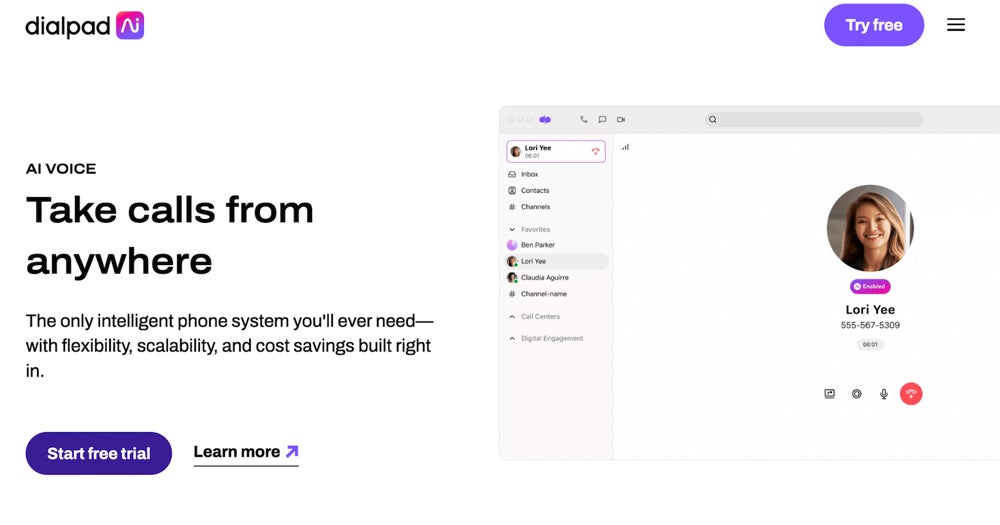
Multi-level auto attendant
Dialpad’s auto attendant is ideal for inbound call handling. You can fully customize the way calls get routed depending on day, time, agent skills, caller intent and so much more.
You can start by customizing your business hours and agent hours, and define the exact times you want to activate your auto attendant. From there, you can create a custom queue to prioritize calls and they will be routed to specific departments or teams based on your settings.
For example, a 24/7 plumbing business may want to prioritize emergency water leaks. Or some businesses may choose to prioritize new customer payments and billing over general support questions.
Dialpad AI Contact Center and AI Sales Center plans come with a full Interactive Voice Response (IVR) system — taking your auto attendant one-step further with even more advanced options that allow callers to control their own routing path.
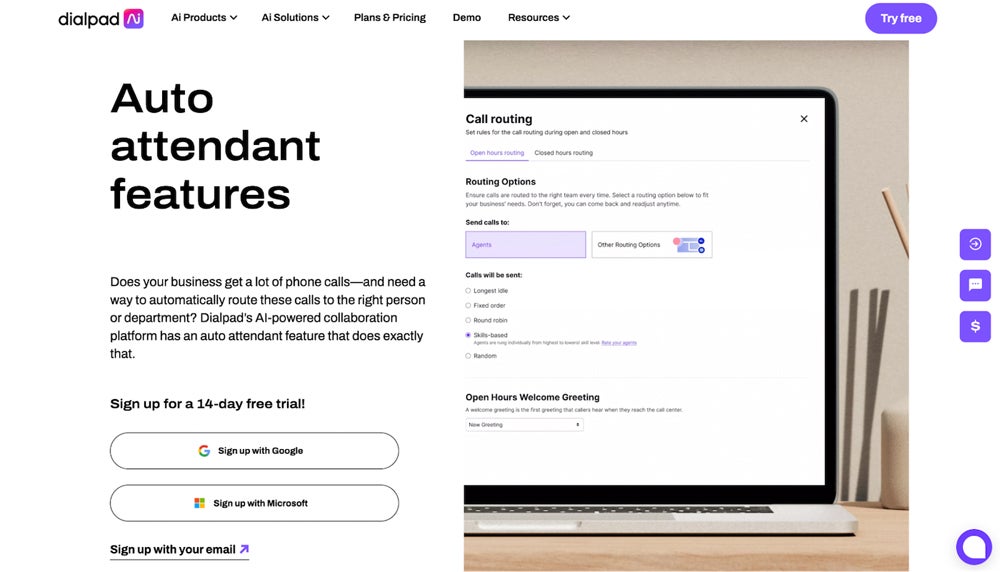
Built-in call analytics
Every Dialpad plan comes with strong analytics features. Even on the entry-level plans, you’ll benefit from real-time call transcriptions and reporting.
It’s easy to keep track of your most important metrics from one screen. You get instant visibility into vital call center metrics, like abandoned call rates, heat maps of your highest call volume times, missed calls, what percentage of calls are forwarded to another number, and more.
At higher tiers, the analytics get even more powerful. You can unlock advanced reports for things like live caller sentiment analysis, compliance measurement and even workforce management capabilities for forecasts and scheduling.
Overall, Dialpad’s analytics provide a richer, more customizable perspective than many of its peers, especially when you compare entry-level plans.
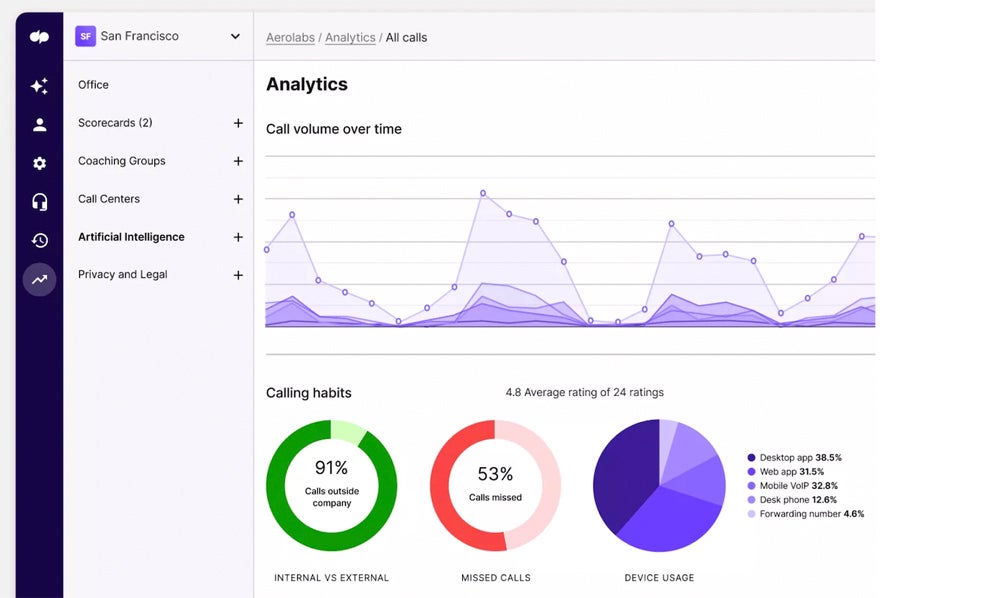
Call coaching
The call coaching features are only available if you’re on a Sales Center or Contact Center plan, but the entire set — call monitoring, whispering and barge — are available as standard features for both of these products. This means you won’t have to upgrade to a higher plan tier as long as you’re choosing a subscription within these two categories.
Live monitoring allows managers to listen-in on calls whenever they want, which makes it easier for managers to monitor the quality of agent conversations, and coach them in real time if necessary. It’s an easy way to ensure reps are sticking to the script and support your quality assurance efforts.
The whispering feature is great for coaching new agents in real time or helping anyone on your team navigate difficult circumstances. If necessary, managers can barge in and take over the call altogether. Customers love this, as they won’t have to wait on hold or go through a lengthy transfer process to escalate calls.
Dialpad AI
Dialpad has some level of AI incorporated into all of its plans and lots of its features, but the extent to which it’s available varies based on the product you’ve selected and the plan tier within that category.
Broadly speaking, the Contact Center and Sales Center plans have the most powerful AI capabilities. But even some of the cheaper plans give you a taste of Dialpad’s AI and automation features.
Some of the key capabilities of Dialpad AI include:
- Real-time voice transcription.
- AI voice analysis for customer sentiment.
- Automated call summaries.
- QA scorecards.
- Real-time agent assist.
- Playbooks for sales reps.
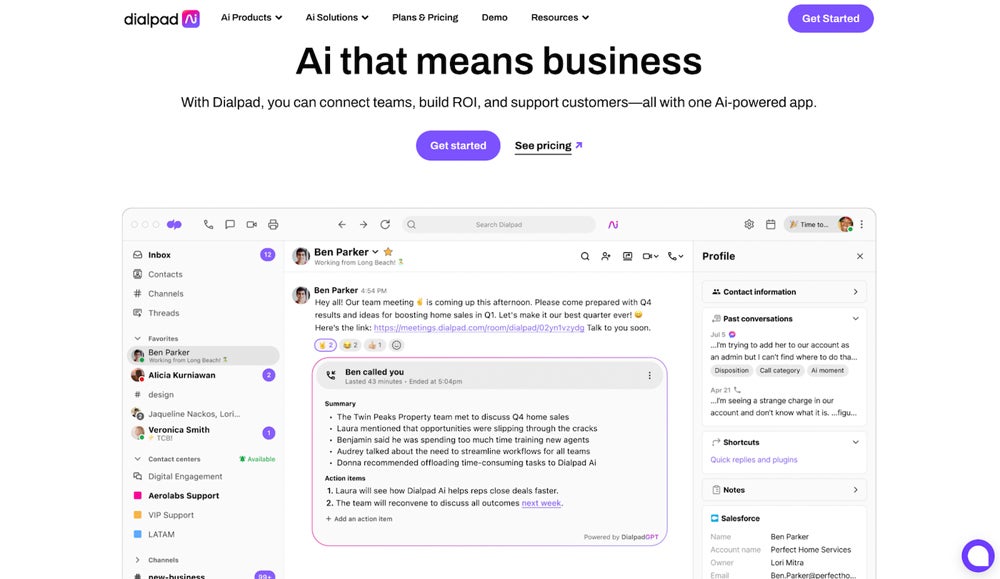
Dialpad pros
- A ton of AI-powered features.
- Affordable entry-level plans.
- All-in-one communications suite.
- Specific plans for outbound sales calls.
- Analytics on every tier.
- Modern and clean interface.
- HIPAA, GDPR, ISO and SOC Type 2 compliant.
- Member of the Cloud Security Alliance (CSA).
- Role-based access controls.
Dialpad cons
- 24/7 phone support only on higher tiers.
- Internet faxing is an extra $10 per month.
- Expensive contact center plans compared to alternatives.
- IVR is only included with premium plans.
Alternatives to Dialpad
Dialpad has some of the cheapest rates in the business phone service category. $15 per line on the entry-level plan is very attractive. But its contact center and sales engagement offerings are much more in line with their peers price-wise, if not on the higher side.
RingCentral has a better all-around value than Dialpad, and will be much more accommodating for companies that would like to keep some of their old technology in service as they transition to the cloud. Nextiva is another alternative to consider, and may allow for more rapid deployment than RingCentral.
Here’s a closer look at how Dialpad compares to its closest competitors.
| Starting price | |||||
| Free trial | |||||
| Setup | |||||
| International numbers | |||||
| Call recording | |||||
| AI features | |||||
| Video meetings | |||||
| Texting | |||||
| Online fax | |||||
| Team chat | |||||
| Integrations |
RingCentral (See full review)
If you want a solution with every feature under the sun, RingCentral is the way to go. It has similar AI capabilities to Dialpad, but goes further with its contact center plans. You’ll also have access to contact center workforce optimization, agent engagement, scheduling, performance management and full customer journey mapping.
Nextiva (See full review)
Dialpad has an edge for AI-powered contact center solutions, but Nextiva is more well-rounded. It has simple and affordable small business plans, competitive contact center solutions, and a full-suite of tools for unified customer experience management. Plus, it offers 24/7 support no matter how much you pay.
Ooma (See full review)
Need something simple and streamlined for an in-person office? Ooma’s DIY plug-and-play set-up process is the easiest of the bunch. No technical expertise required.
8×8 (See full review)
Compared to Dialpad, 8×8 feels a little stale, but the company has the infrastructure to help companies migrate contact centers to the cloud from on-premise systems at their own pace. 8×8 also gives you unlimited international calling to up to 48 countries (depending on your plan). This is a great way to save money if you handle a high volume of international communications.
Methodology
When putting this review together, I leaned on my own experiences, customer reviews and a set of core criteria I use when reviewing every business communications solution.
Basic and premium features
I look at a company’s business communications features to see what’s included in the entry-level plan, and what customers must upgrade to access. The biggest thing I am looking at are the channels included (voice, video, SMS, etc.) and the depth of key call center features, such as IVR, analytics, call routing, and so on. Then I compare the price-point vs. the features included to peers in the space.
Customer support
I consider customer support hours, customer support methods (phone, live chat, knowledge base, etc.), and how helpful the customer support team actually is based on customer reviews. As always, I take the negative reviews with a grain of salt — the most angry customers are most likely to review.
Third-party integrations
I check each platform’s ability to seamlessly connect with other business tools, like CRM software, SMS, faxing, cloud storage, ERP and more. It’s very difficult to forecast how difficult contact center integration will be, but I give bonus points to companies that have extensive content about specific integrations or public API documentation.
Security and privacy
I assess the tool’s encryption, redundancy architecture, role-based access management, server locations, data center audits, authentication capabilities via SSO and MFA, and more. For business communications products, I am also interested in whether or not a vendor will sign a BAA, which is required for HIPAA compliant VoIP services.
Demo or free trial
I check for the ability to test or try the software before committing through a live demo or free trial.
Overall cost
This represents the total overview of plans, extra fees, add-ons, differences between paying monthly or annually, user costs and installation costs.














